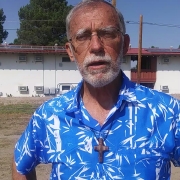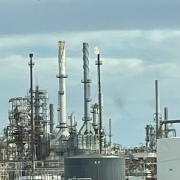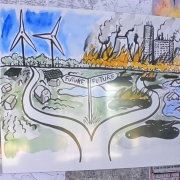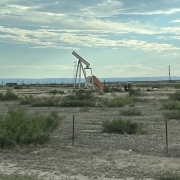Fr. Thomas Smith OFM Conv.
Las Cruces Sun-News
 As a faith leader, and the director of the Holy Cross Retreat Center near Las Cruces, I want to address my concern for climate change and how legislation can be helpful.
As a faith leader, and the director of the Holy Cross Retreat Center near Las Cruces, I want to address my concern for climate change and how legislation can be helpful.
We pray that September will bring the monsoon rains that were mostly absent in July. All around us we are witnessing the impacts of record heat and unpredictable weather patterns. Our forests, our mountains, our farms, our gardens, our human and non-human communities – all are straining under the stress of our rapidly climate changing world. Amidst our multiplying weariness and worry, all of us are called to respond so that we may better care for the gift of this creation to us and to all the generations to come.
In November, leaders in New Mexico will be called to do just that – to care for creation and help protect the sacred rights of future generations. Coming before the Environmental Improvement Board and Albuquerque Bernalillo Air Quality Board are new Advanced Clean Car and Truck Standards. Updating these standards will require auto and truck manufacturers to deliver an increasing number of electric vehicles for sale in the region, creating jobs, broader accessibility, cleaner air, and helping us significantly curb statewide carbon emissions. Over the coming decade and more, federal government programs will continue to help create electric vehicle infrastructure, such as charging stations, in our very rural state. Adopting these standards will help get electric vehicles out on the road and make them more and more affordable and viable with each passing year for all New Mexicans. There is no good reason these technologies should not be within reach for most people. This is our opportunity to ensure no one is left behind in the transformation of our transportation systems.
Of course, no one action or technology is a complete solution and there are complexities we must all consider. Right now, manufacturing electric vehicles still requires burning fossil-fuels and there are important concerns about the impacts of mining for critical minerals required in their production. While it is scientifically proven that the transition to electric vehicles will reduce carbon emissions, at the same time we must work on mining reform to ensure environmental injustices are not reproduced, especially for tribal nations in New Mexico and beyond. For these reasons, we must act with both urgency and wisdom as we continue to discern the many ways we are being called to change the ways we live as the planet changes around us. Focusing on conservation of resources and shifting our consumptive worldviews is essential, even and especially as we discover new ways to produce energy.
Pope Francis recently announced that he will be adding a second letter to his encyclical on climate change, Laudato Si, On Care of Our Common Home. This addition is aimed at addressing the evolving contexts and urgency of the climate crisis. It is most fitting that the Pope’s announcement came just before the beginning of the season of creation in September – a month where Christian communities of faith around the world celebrate our sacred relationality with and responsibility to care for the entirety of our earth community.
As people of faith and conscience here in New Mexico, we have a sacred responsibility to address the evolving contexts and urgency of the climate crisis through the electrification of our transportation systems In Las Cruces we continue to live in a nonattainment zone which does not meet national standards for clean, healthy air. Adopting these clean vehicle standards will help move our state toward responsible electrification and healthier communities for us all. In this season of creation, let us pray for rain. And in the spirit of St. Francis of Assisi, the patron of ecology, let us embrace our common calling to care for what we hold in common and take this responsible step forward in our transportation systems.




